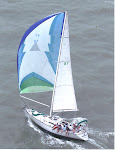Do you think that you are a
good enough sailor to sail 240 miles up the Florida coast without an
engine. I thought I was. I wish I had never had that thought.
After cooling down overnight
from all of the excitement of anchoring under sail in Lake Worth I
phoned the US Customs to clear in. We had prepared extensively
before leaving the US in order to participate in the Florida Local
Boater's Option. By visiting the Customs office ahead of time and
doing considerable work on the internet we hoped to be eligible to
clear customs upon returning to the US with a phone call. The process
worked well and within 20 minutes I had a clearance number. We had
never even stepped off the boat. Jan worried that our border
security seemed weakened somehow. But I think that by streamlining
the routine stuff, Customs can concentrate on the bad guys.
For the next two days I
fiddled with the exhaust system. I called our new mechanic, Al, and
got several suggestions. Somehow the cooling system started working
again. I was not quite sure how or why, but the engine purred along
for 20 minutes and water poured out the exhaust. We canceled plans
to haul out in West Palm Beach. We would try to make Green Cove
Springs on the St. John's River. The St. John's River entrance is
240 n. miles north of West Palm Beach.
The weather forecast was
perfect. Four days of dry moderate SE breezes were predicted.
Within 30 minutes of making the decision White Pepper
was motoring out the Lake Worth Inlet. The afternoon was perfect
with moderate quartering breeze and seas. With the edge of the Gulf
Stream pushing us along we were making rapid progress north.
Rounding Cape Canaveral that night, the wind lightened (NOAA said it
would strengthen) and the seas became lumpy for some reason. I
turned on the motor to get some more forward motion and hopefully
allow the off watch crew to rest. After 3 hours the motor
overheated. We were once again a pure sailboat.
The
next two days were difficult. We slowly gybed the boat down wind as
the wind became weaker and weaker. I did not want to set the pole in
the lumpy seas or if the wind were really going to build. I
downloaded the GRIB files and sure enough it was supposed to be
blowing 20 knots. The radio was calling for breezy conditions which
would have easily blown us up to the St. John's River. Looking out
from the cockpit what I saw was 6-10 knots of wind and 3 knots of
boat speed. The atmosphere was clearly unstable and despite dry
predictions thunderstorms were building over the coast 15 miles away.
We
tied down everything on the deck. I put the electronics in the oven
which can act as a “Faraday cage”. We took down the main sail
and lashed it to the boom. About 8 pm when the first rain drops were
falling, we rolled up the Genoa to flag size, sheeted it tight and
went below.
The
line squall struck hard about 2010 with 35 knot winds and gusting
rain. Fortunately most of the lightning was cloud to cloud. About
2020 NOAA was warning of a major line squall moving off the coast.
We stood watch from behind the dodger and by watching the AIS display
below. The little flag of a foresail caught enough breeze to pull us
along at 4 knots and keep the motion reasonable. It was all over
within an hour.
By
midnight when my watch started the SE breeze was back in force. The
St. John's jetties were only 65 miles away. At 6.5 knots we would be
there by late morning, just in time to catch the flood tide. Things
were looking up! However, by 4 am the wind had died for good. Boat
speed was under 3 knots. It looked like we would have to spend
another night at sea. At dawn there were ominous clouds over the
shore and another evening squall seemed like a sure bet. Even NOAA
had caught on and was calling for thunderstorms. Jan and I decided
to throw in the towel, and divert to St. Augustine 26 miles away, and
call for help.
Arriving
at the St. Augustine sea buoy about noon, Captain Dan on the Sea Tow
4, came out to meet us. There was no way I was going to try the
treacherous St. Augustine Inlet without power (or even without wind).
Captain
Dan did an expert job with the tow, negotiating the Bridge of Lions
lift bridge and putting us gently on the dock at the River Edge
Marina on the San Sebastian River. Another thunderstorm struck just
as he was casting off. Getting a Sea Tow membership seemed like the
smartest thing I had done all season.
St
Augustine is the end of our retreat from George Town. I am going to call a proper mechanic to look at the motor.
Being
forced to sail without a motor for 3 days was a humbling and
instructive exercise. Dealing with the really light airs for hours
and days was trying. With a working motor, just a push of the button
takes all that misery away. I believe that just sitting there
waiting to be run over by a tanker or a thunderstorm was the worst
part. Finally, my previously high confidence in the GRIBs and modern
weather forecasting in the supercomputer era has been shaken. I never
would have started off on this voyage if given an accurate forecast.



No comments:
Post a Comment